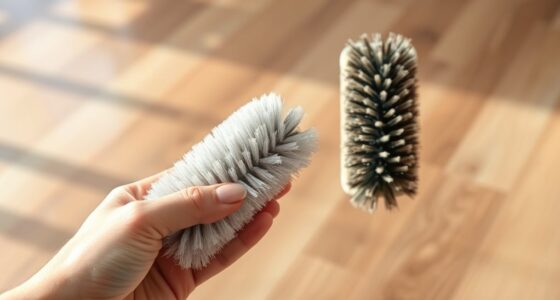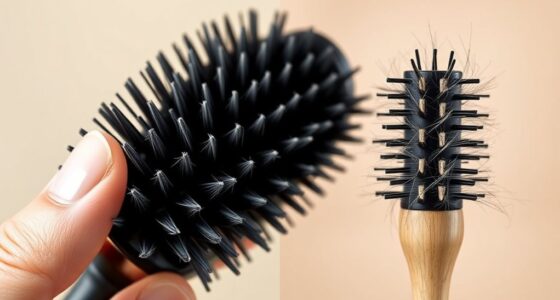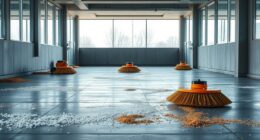For hardwood floors, soft bristles are best for gentle surface dusting and routine cleaning, helping prevent scratches and preserve your finish. Stiff bristles work well for deep scrubbing stubborn dirt or tough spots, but they can scratch delicate surfaces if used improperly. To keep your floors looking their best and avoid damage, choose your brush type based on the task. Keep exploring how to select the right tools for every cleaning challenge to protect your floors long-term.
Key Takeaways
- Soft bristles are ideal for gentle dusting and regular maintenance, preventing scratches on hardwood floors.
- Stiff bristles are suitable for deep cleaning stubborn dirt, grime, and sticky spots on hardwood surfaces.
- Using soft bristles regularly helps preserve the floor’s finish and prolongs its lifespan.
- Stiff bristles can cause scratches if used improperly on delicate hardwoods, so they should be reserved for tough cleaning tasks.
- Properly matching bristle type to cleaning need ensures effective cleaning while protecting the floor’s integrity.

When choosing a hardwood floor brush, understanding the different bristle types is essential for achieving the best cleaning results. The debate between soft versus stiff bristles often comes down to whether you’re doing a quick sweep or a deep scrub. If you’re comparing sweep vs. mop, the type of bristle you select can markedly influence how effectively you remove dust, dirt, and debris without damaging your floors. Soft bristles are ideal for light dusting, gently lifting surface particles without scratching the finish. They’re perfect for regular maintenance, especially if you want to prevent scratches or preserve the shine. On the other hand, stiff bristles excel when you need to scrub stubborn dirt or debris embedded in the grain of the wood, making them suitable for more intensive cleaning sessions.
Additionally, choosing the proper bristle type can help maintain the longevity of your floors by preventing unnecessary wear and tear. When deciding between dusting vs. scrubbing, soft bristles shine in dusting tasks. They glide smoothly across the surface, gathering dust and loose debris with minimal effort. Using the right soft-bristled brush regularly keeps your floors looking fresh and prevents dirt buildup. However, if your floors are heavily soiled or have sticky spots, stiff bristles become necessary. They provide the scrubbing power needed to loosen dirt that’s been ground into the wood or stuck in crevices. Keep in mind that using stiff bristles on delicate or finished hardwoods can cause scratches, so it’s crucial to choose the right brush for the job.
The type of bristle also influences how you approach cleaning techniques. For light dusting, soft bristles allow you to sweep gently, removing surface dust without disturbing the finish. When you need to do a deep clean, switching to a stiff-bristled brush or a scrub pad helps break down grime and restore the floor’s appearance. It’s important to match your cleaning method with the bristle type—soft for dusting and light cleaning, stiff for scrubbing stubborn spots. Using a soft brush for routine dusting prevents dirt from settling into the wood grain, while a stiff brush can be reserved for periodic deep cleaning when necessary.
Furthermore, selecting the right bristle type can aid in protecting the finish of your hardwood floors, ensuring they stay shiny and scratch-free over time. Ultimately, choosing the right bristle type depends on your specific cleaning needs and the condition of your hardwood floors. Remember, soft bristles are gentle and ideal for regular maintenance, while stiff bristles provide the power needed for tougher grime. Understanding when to sweep vs. mop and dusting vs. scrubbing ensures you use the appropriate tools, protecting your floors while keeping them spotless. Properly matching your cleaning approach with bristle types not only extends the life of your hardwood but also keeps it looking beautiful for years to come.
Frequently Asked Questions
How Often Should I Replace My Hardwood Floor Brushes?
You should replace your hardwood floor brushes every 6 to 12 months, depending on usage. Regularly inspect the bristles for wear and tear, as worn brushes can scratch surfaces and reduce cleaning effectiveness. Follow manufacturer recommendations for your specific brush type, and consider switching to softer bristles for delicate floors. Proper cleaning techniques and timely replacements help maintain your hardwood’s beauty and longevity.
Can Soft Bristle Brushes Damage Hardwood Surfaces Over Time?
Soft bristle brushes typically won’t damage your hardwood floors over time, as their gentle bristle softness minimizes floor damage. However, using overly stiff brushes or applying excessive pressure can cause scratches or wear. To keep your floors in great shape, choose soft bristles for regular cleaning and avoid aggressive scrubbing. This way, you prevent floor damage and make sure your hardwood stays beautiful for years.
Are There Eco-Friendly Bristle Options for Hardwood Floor Cleaning?
You’ll be glad to know eco-friendly bristle options exist for hardwood floor cleaning. Around 75% of consumers prefer sustainable products, and biodegradable fibers and recycled materials are popular choices. These brushes effectively clean without harming your floors or the environment. Look for options made from bamboo, plant-based bristles, or recycled plastic. Using these eco-friendly brushes helps protect your hardwood floors while reducing your ecological footprint.
How Do Bristle Types Affect Dust and Allergen Removal?
Your choice of bristle material directly impacts cleaning effectiveness in removing dust and allergens. Soft bristles gently lift particles without scratching, ideal for delicate hardwood surfaces. Stiff bristles, on the other hand, excel at dislodging stubborn dirt and debris but can cause scratches if used improperly. For best dust and allergen removal, select a brush with the right bristle type that balances cleaning power with floor safety.
Do Different Bristle Types Work Better for Specific Hardwood Finishes?
Imagine gently gliding a brush over your hardwood, feeling the subtle difference in bristle stiffness. For glossy, delicate finishes, soft bristles caress without scratching, offering better hardwood compatibility. Stiff bristles, on the other hand, scrub stubborn dirt but risk damaging sensitive surfaces. Choosing the right bristle stiffness depends on your hardwood’s finish—soft for refined surfaces, stiff for tougher cleaning, ensuring your floors stay pristine without harm.
Conclusion
Choosing the right bristle type can make all the difference when cleaning hardwood floors. Soft bristles gently lift dust without scratching, while stiff bristles tackle stubborn dirt more effectively. Did you know that using the wrong brush can reduce your cleaning efficiency by up to 30%? So, next time you clean, pick your bristles wisely. Your floors will thank you for it, staying beautiful and scratch-free for years to come.









